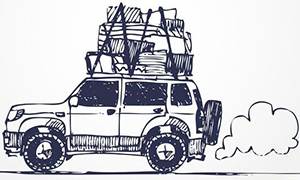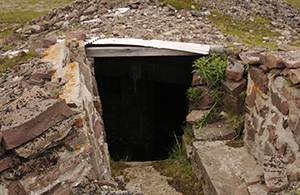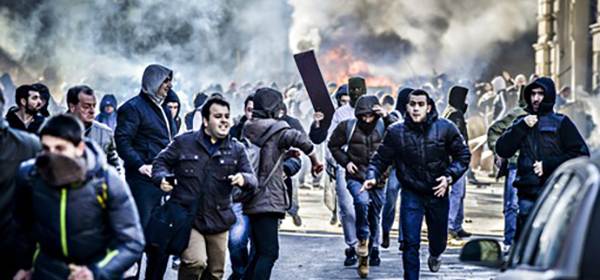Most of us prep for what is going to happen after a disaster. We store water, food, guns, etc. But all of your prepping supplies are in vain, if you don’t survive the actual event.
No matter how well-prepared you are what you do in the first 24 hours after disaster should be your no. 1 priority. After all, it really doesn’t matter how much you have stored away if you aren’t able to get to it or if someone else takes it. If you want to live to eat all that food, drink all that water, and stay alive you need to take immediate action when disaster strikes.
Level of Chaos
Naturally, what the first 24 hours will look like depends on what specific event sends society in a downward spiral into disaster. If it is a pandemic, then you might find things move more slowly at first, and as the spread of the disease grows, the speed at which it progresses increases. Alternatively, if the event is a nuclear attack, things will go downhill very quickly.
Regardless of the type of event, if it is truly going to cause the collapse of society, there will most likely be a point at which things turn suddenly. It is at that point that chaos will erupt and it will become difficult to determine what to do in the moment. That is why you need to think about this in advance. Have a plan of what basics you need to take care of in the first few minutes and hours after disaster strikes, regardless of what form that disaster takes.
Don’t Wait for Government Help
When things break down, even in the midst of the chaos and panic, most people will still be expecting the government and authorities to swoop in and rescue them. This isn’t going to happen. There is a point at which even those in charge will give in and run to their families to be with them and protect them. And even if the government does provide aid, if the disaster happens quickly and over a large geographical area, it will take them time to get to everyone, determine what people need, and set up and method of distribution. Don’t wait like everyone else. If you do, you’ll be sorry. Just watch this video and learn what happened during Katrina.
Steps to Take
What should you do during the first 24 hours of SHTF or TEOTWAWKI? Chances are, as a prepper you know the collapse has come long before anyone else realizes it. If you have been preparing for a long time, chances are you know the signs and will see them while everyone else is watching TV (if they can) and wondering what is happening and what to do. This is your small window of opportunity to spring into action. Here are some steps you can take immediately after the collapse:
- Get Out of Harm’s Way
 The very first thing you must do when disaster strikes is ensure you and your loved ones are out of immediate danger. Getting somewhere safe immediately requires you to quickly assess your situation to determine if there is any immediate threat to you or your loved ones. This is probably going to happen within the first minute after disaster strikes.
The very first thing you must do when disaster strikes is ensure you and your loved ones are out of immediate danger. Getting somewhere safe immediately requires you to quickly assess your situation to determine if there is any immediate threat to you or your loved ones. This is probably going to happen within the first minute after disaster strikes.
- Check for Injury
Once you are out of immediate danger, the next ten or so minutes will be devoted to checking and making sure you and anyone else you are with are not injured in any way. Make sure there are no physical injuries and that no one has been exposed to a toxic substance or someone who is sick with a contagious illness. If there is an injury or exposure, take the time needed to ensure the immediate care of that person and minimize exposure to others in the group, if necessary.
- Get Home or to Your Rendezvous Location
 Once everyone is out of immediate danger, you need to get yourself home (or to a rendezvous location). Your initial assessment of the situation and your immediate surroundings will tell you whether that is feasible and how easy that will be. Get home by the quickest and safest route possible.
Once everyone is out of immediate danger, you need to get yourself home (or to a rendezvous location). Your initial assessment of the situation and your immediate surroundings will tell you whether that is feasible and how easy that will be. Get home by the quickest and safest route possible.
Related: Find Safe Refuge in a Container Cabin Made Just For You
- Assess the Situation and Gather Intel
You need to know what happened, and once you know everyone is safe and at home, you can take the time to do a full assessment of your situation and gather the necessary intel to determine the full impact of the event, whether it is a natural disaster, a pandemic and new cases have popped up in your town or city, a nuclear attack, or some other event. What has happened will have an impact on what your next steps are.
You will need to determine:
- The specific event that occurred
- The short-term and long-term impact of the event
- Whether you can hunker down at home (bug in) or you should get out of Dodge (bug out)
You will need to gather as much information as you can as quickly as you can in the first 24 hours after the event occurs. If the electricity is still functioning and you can access the news and/or internet, find out as much information as you can in that manner. If there is no electricity where you are and you have a solar or hand-crank radio, see if you can pick up any signal with that. If you have set yourself up with a ham radio, even if you don’t have a license to transmit, you still have the ability to listen in on the conversations going on around you or to receive communication from someone in your prepper group.
If you have to go outside to gather intel, be sure you are prepared to stay safe. The fewest people possible should leave the safety of your home and you should be armed and dressed appropriately, such as wearing a minimum N95 mask (more protection if needed) for a potential contagion or a gas mask if there is a chemical threat. Get the information you need as quickly as you can and get back to home base.
- Augment Your Preps
Sometimes, there is a short period of time (just a matter of hours in some cases) after an event happens during which most of the population is still in the “what happened” phase. This means full panic and chaos has not yet hit, and if you need to augment your preps at all, this is the ideal time to do it. Presumably, you have cash on hand (should be part of your preps) so you can pay for items if the ATMs are down. Get out there, get what you need, and get back home as quickly as possible, avoiding people as much as you can in the process.
- Blend In
 By this I mean act like everyone else. You have preps and you know your family is safe, but no one else knows that (hopefully!). If the people around you, those in your neighborhood, are out talking and wondering what’s happening, when the food and help is coming, where the shelters are being set up, and you aren’t doing the same thing, someone is going to wonder why. Provided it’s safe enough, spend some time going out and asking questions and generally acting like everyone else to make it look like you are as desperate and confused as they are. This will put them off your prepper scent and give you the space you need to breathe and determine what to do next.
By this I mean act like everyone else. You have preps and you know your family is safe, but no one else knows that (hopefully!). If the people around you, those in your neighborhood, are out talking and wondering what’s happening, when the food and help is coming, where the shelters are being set up, and you aren’t doing the same thing, someone is going to wonder why. Provided it’s safe enough, spend some time going out and asking questions and generally acting like everyone else to make it look like you are as desperate and confused as they are. This will put them off your prepper scent and give you the space you need to breathe and determine what to do next.
Within the first 24 hours, you should be able to tell how bad the situation is and how quickly it will deteriorate. This will allow you to make more concrete, long-term plans to get yourself and your loved ones to safety so you can survive the event that has brought society to its knees. Just remember to keep your cool, keep your head clear and focused, and be as thorough as possible with your assessment of the situation. Then you and your family will have the best possible chance of survival.
You may also like:
The 7 Lost US Nuclear Bombs That ISIS is trying to Get Their Hands On
The EMP Preparedness Guide (Video)
10 Things to Do on the Day the Economy Collapses
An Insanely Effective Way to Build a 5 Year Food Stockpile (Video)
















I am getting tired of the entire bug out idea being perpetuated. Its a fantasy for 99 percent of people. Its better to concentrate on civic cooperation and preparation. Form community disaster groups.
The last thing you need to do is run out on the freeway and clog it up with the other sheep.
Don, you’re absolutely correct!
Those who “bug out” (when their supplies run out) will MORE than likely become the “looters” that will need to be dispatched before they steal your preps.
A family of like-minded individuals is NOT enough. A like-minded community is essential because it takes many members to be on guard 24/7 for 365 days a year.
I agree. I’m a paraplegic in a wheelchair, prepared and packing. Everything I need is here.
I agree, unless there is a lake of molten lava or something else headed my way that could wipe me and my family out, I’m staying put.
Are you staying because of your area? I live in a suburban area, and am unsure of whether or not to bug out or bug in. I have an aunt in Georgia, with a slightly more rural neighborhood, where I could bug out to. My family could stay on back roads to get there, though the challenge would be that I am in Texas. On the other hand, I live in a sturdy house, 1 story, no basement, in a medium sized neighborhood. It’s quiet, so I’m not going to be threatened by gangs if I stay put. The thing is, I have a very small backyard, and live very close to neighbors. I could team up with them should the need arise, but am unsure about that option because they may become more of a liability than a help. they are more of a ‘im sure the government will help us, there is no reason to worry’ type of people. there is also a pond near us for water source, but there is also one in my bug out location. Also keep in mind that since I am only 13, I have limited resources. I have a source of income through reffing soccer, so I can buy reasonably priced gear and equipment, but I can’t do anything to expensive. Please give me your feedback, and thank you.
Confederate reenactment. Look up the type of gear They Carried and how they prepared, the type of rations they would have, and also look up things like Euell Gibbons and other people who point out Wild forms of plant life that can be eaten–one good example is the roots from cat ‘o’ nine tails. I’m not sure but think you may be able to purchase black powder replica arms such as a Lemat 44 revolver (very expensive) or a Colt model 1860 (less costly) you could check out different flea markets,reenactor groups– they may have lower-priced weapons. Then there is the problem of getting black powder and caps …you could have a family member purchase those for you.
That was how I became well-armed in New York City where they don’t allow you to have anything cartridge manufacture unless you pay enormously stiff fees. Four cap and ball revolvers –well that’s a pretty fair number of bullets, right?
Thank you! That is incredibly useful, I never thought about it. Thank you for your time
Dollar Tree…purchase medical meds ,firstaid items in quanties you can store or pack in a bug out kit. you can later trade such items for food etc. Knives and a hand axe dont need to be expensive items. Walmart type camping gear isnt a bad bet. Join a Boyscout troop to learn some basic skills to survive. Proud of you for even thinking ahead at your young age.
Your best bet is to make yourself unknown to others. Hide away in an attic or cellar or basement. No light, no sound. You don’t exist. When things calm down, slowly asses the situation and come up if it’s safe.
Also helpful, thank you very much. But, in a long term SHTF situation, will I have wasted to much time waiting until it’s safe to come out instead of finding resources and working to make my home good enough for a long-term situation?
Bunker-in is the only choice since it’s where your supplies are and the odds go with defending a fixed position,or otherwise it’s the road. Shoulder sore after a day at the Range and now ready for Christmas Zombies. I’ve found an equipment check every few weeks solves problems and helps mentally prepare.. Recruiting a few select Shooters when I find them. Every Prepper needs to recognize the 7/11 sign out front once people realize food is there and word travels fast among starving people. Your neighbors will figure it out first, but mine already know because I’ve warned them about the need to prepare, maybe not successfully, but they’ll understand what it means when my place goes dark and stays dark after the first day or two. If they aren’t ready in the beginning then they aren’t with me, and the bodies at the property line will tell that story. What else to do? I have cash to fill 8-55gallon drums at first sign of trouble but no need to fight for supplies in the stores. Eventually the word gets around so the Bunker had better look defensible, and be defensible, enough to encourage singles and small groups to pass it by, but at some point every Man would rather take a bullet then face a starving wife and screaming children again. Might be possible to bring Preppers with resources together using CB Radios Channel 3 & 4 once the SHTF. Big question is for “how long?” A fortified position is obvious and sends a message but even a Castle can’t hold out forever but better with one, than without.
Extremely helpful info here, I am a Veteran with a few miles under my boots, been”Up the creek and over the hill”,?Bugging out should be a last resort and an informed, NOT PANIC, reaction.BO is a foolish pipe dream.
Matthew 16:
24 Then Jesus said to His disciples, “If anyone wishes to come after Me, he must deny himself, and take up his cross and follow Me. 25 For whoever wishes to save his life will lose it; but whoever loses his life for My sake will find it. 26 For what will it profit a man if he gains the whole world and forfeits his soul? Or what will a man give in exchange for his soul?